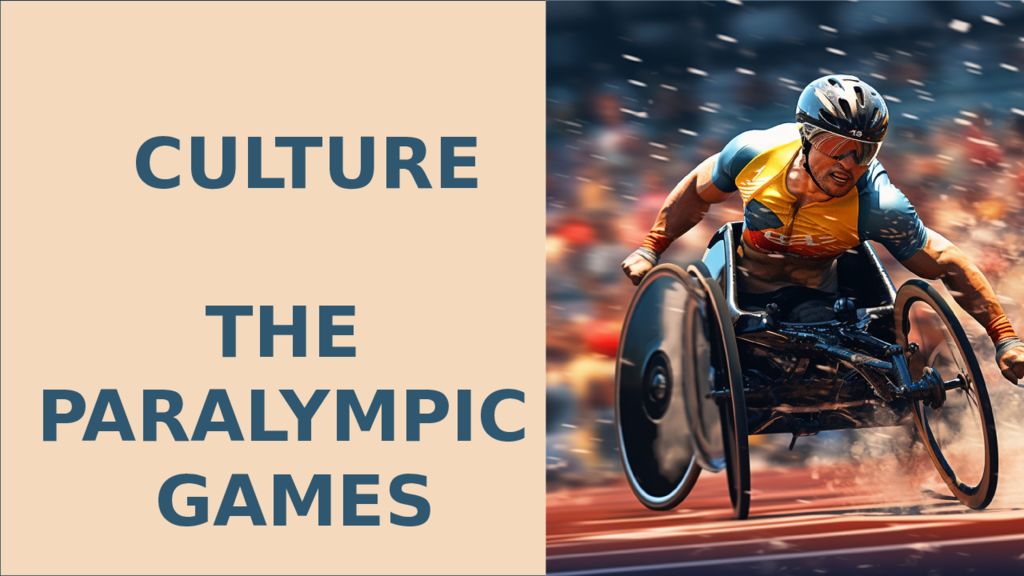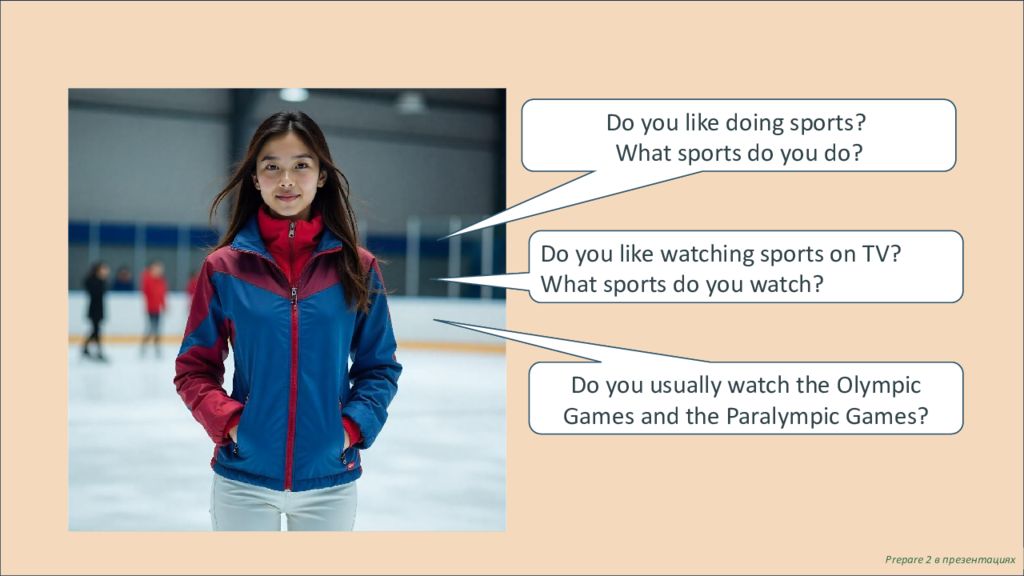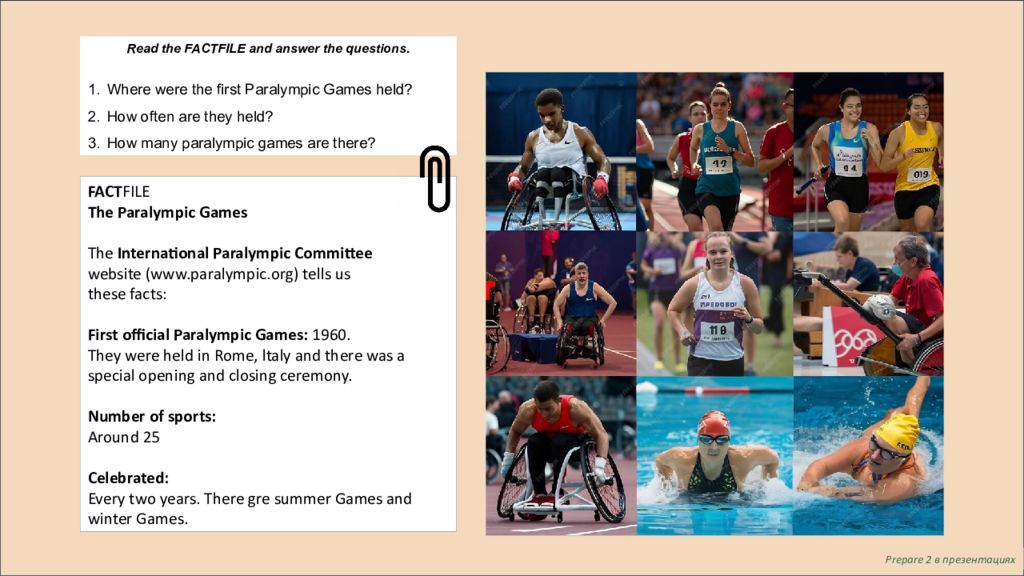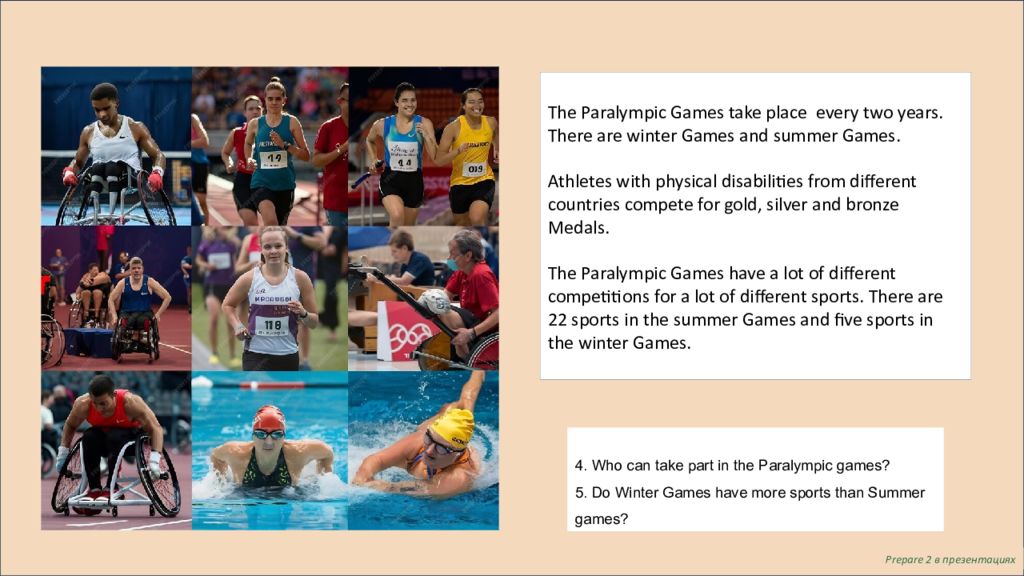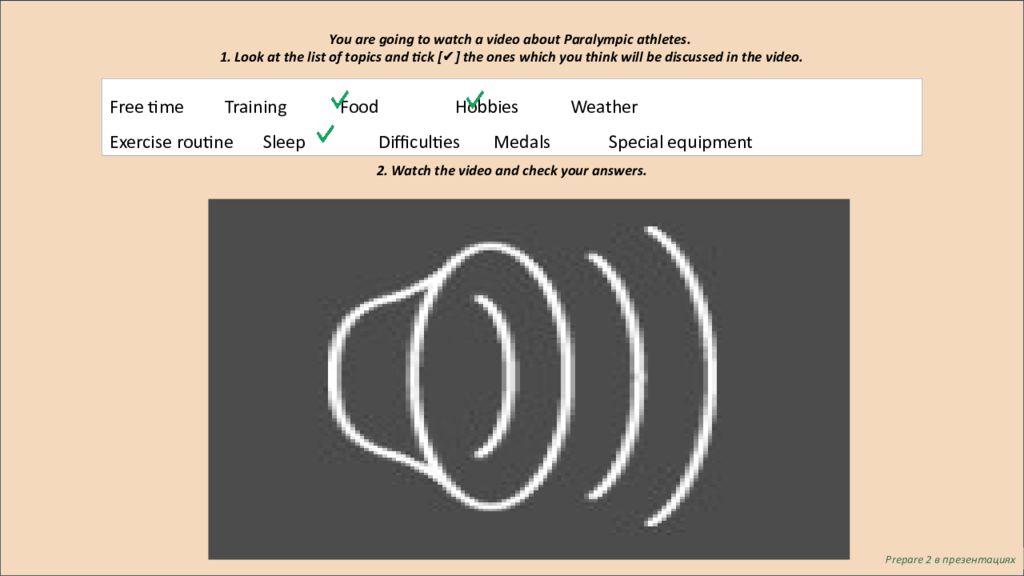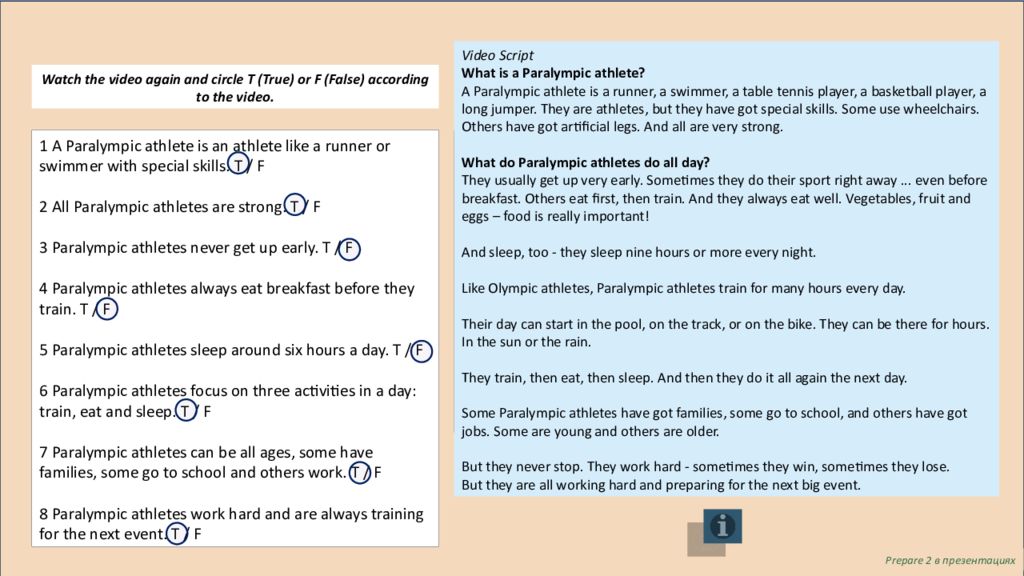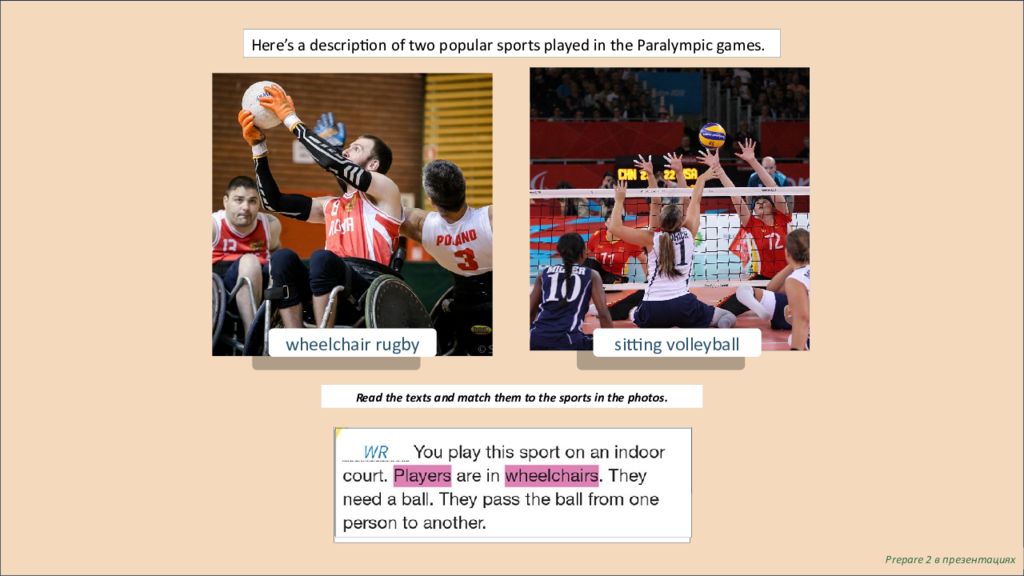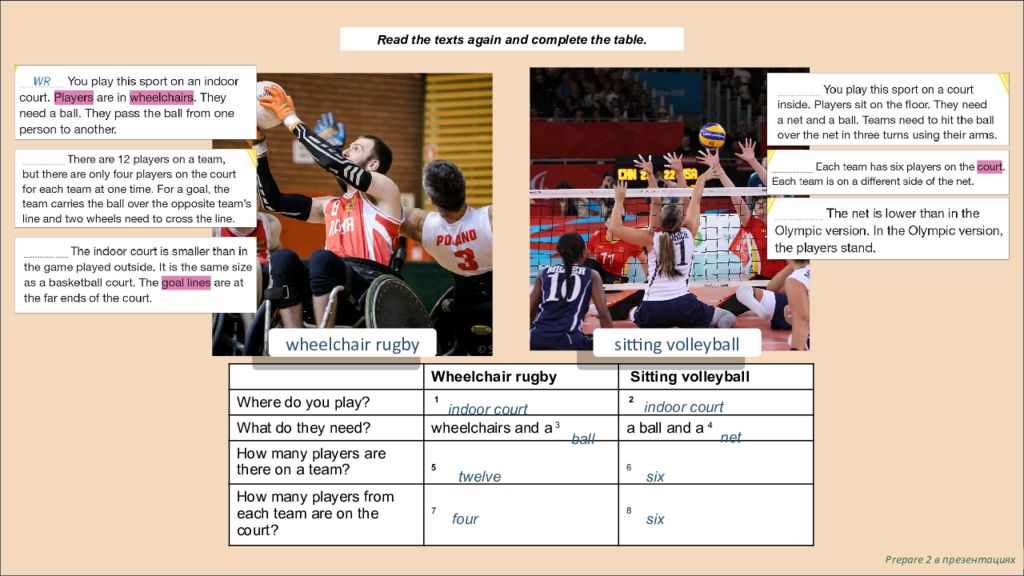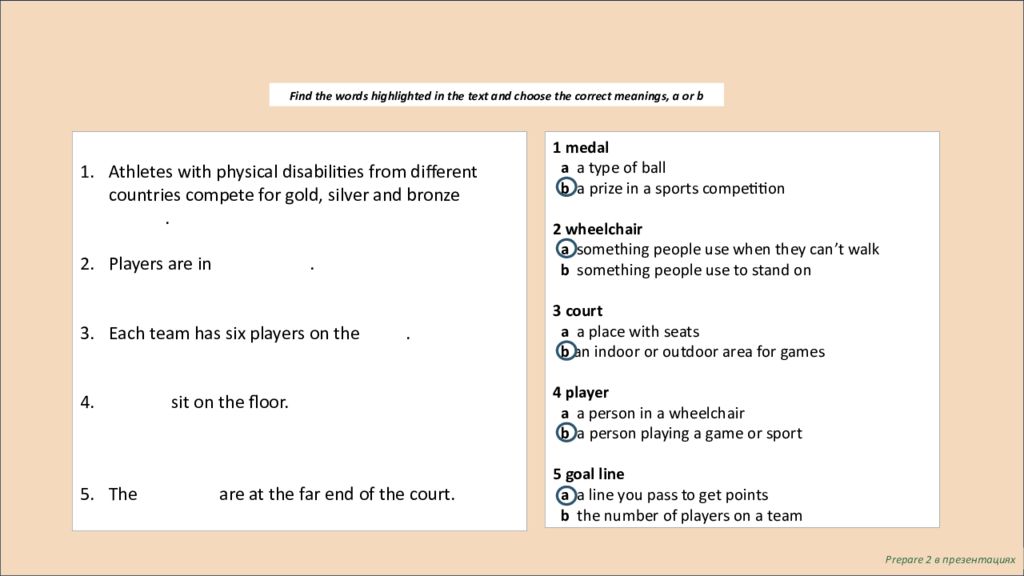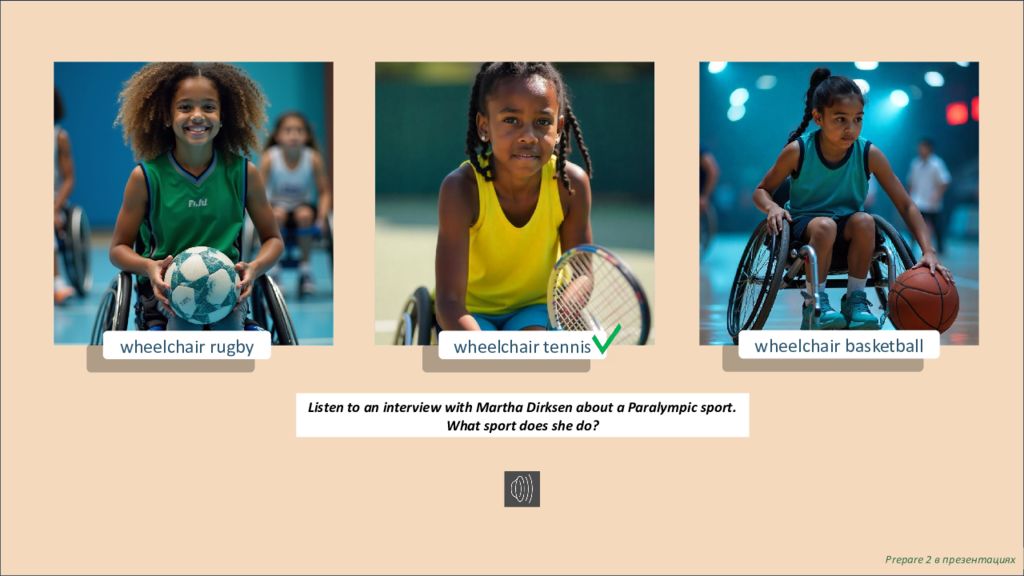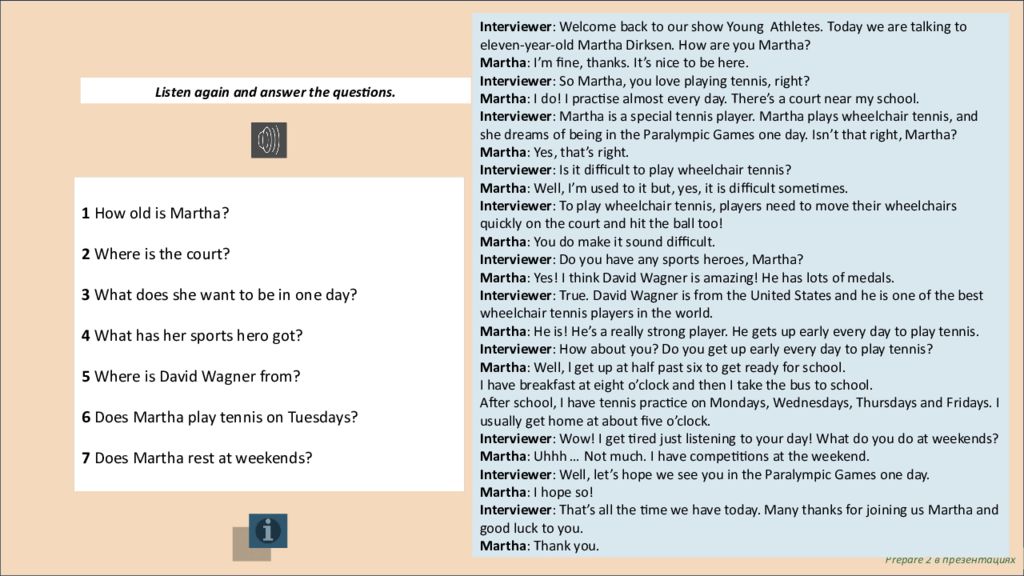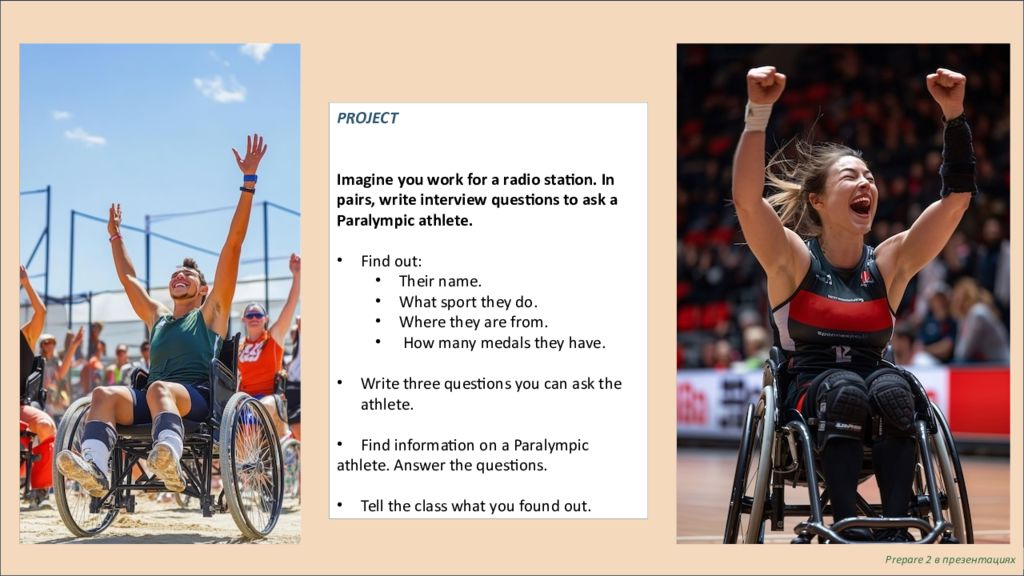Слайд 2
Prepare 2 в презентациях Do you like doing sports ? What sports do you do ? Do you like watching sports on TV? What sports do you watch ? Do you usually watch the Olympic Games and the Paralympic Games?
Слайд 3
Prepare 2 в презентациях Read the FACTFILE and answer the questions. Where were the first Paralympic Games held? How often are they held? How many paralympic games are there? FACT FILE The Paralympic Games T he International Paralympic Committee website (www.paralympic.org) tells us these facts : First official Paralympic Games: 1960. They were held in Rome, ltaly and there was a special opening and closing ceremony. Number of sports : Around 25 Celebrated : Every two years. There gre summer Games and winter Games.
Слайд 4
Prepare 2 в презентациях 4. Who can take part in the Paralympic games? 5. Do Winter Games have more sports than Summer games? The Paralympic Games take place every two years. There are winter Games and summer Games. Athletes with physical disabilities from different countries compete for gold, silver and bronze Medals. The Paralympic Games have a lot of different competitions for a lot of different sports. There are 22 sports in the summer Games and five sports in the winter Games. Free time Training Food Hobbies Weather Exercise routine Sleep Difficulties Medals Special equipment
Слайд 5
Prepare 2 в презентациях You are going to watch a video about Paralympic athletes. 1. Look at the list of topics and tick [✔] the ones which you think will be discussed in the video. Free time Training Food Hobbies Weather Exercise routine Sleep Difficulties Medals Special equipment 2. Watch the video and check your answers.
Слайд 6
Prepare 2 в презентациях Watch the video again and circle T (True) or F (False) according to the video. 1 A Paralympic athlete is an athlete like a runner or swimmer with special skills. T / F 2 All Paralympic athletes are strong. T / F 3 Paralympic athletes never get up early. T / F 4 Paralympic athletes always eat breakfast before they train. T / F 5 Paralympic athletes sleep around six hours a day. T / F 6 Paralympic athletes focus on three activities in a day: train, eat and sleep. T / F 7 Paralympic athletes can be all ages, some have families, some go to school and others work. T / F 8 Paralympic athletes work hard and are always training for the next event. T / F Video Script What is a Paralympic athlete? A Paralympic athlete is a runner, a swimmer, a table tennis player, a basketball player, a long jumper. They are athletes, but they have got special skills. Some use wheelchairs. Others have got artificial legs. And all are very strong. What do Paralympic athletes do all day? They usually get up very early. Sometimes they do their sport right away... even before breakfast. Others eat first, then train. And they always eat well. Vegetables, fruit and eggs – food is really important! And sleep, too - they sleep nine hours or more every night. Like Olympic athletes, Paralympic athletes train for many hours every day. Their day can start in the pool, on the track, or on the bike. They can be there for hours. In the sun or the rain. They train, then eat, then sleep. And then they do it all again the next day. Some Paralympic athletes have got families, some go to school, and others have got jobs. Some are young and others are older. But they never stop. They work hard - sometimes they win, sometimes they lose. But they are all working hard and preparing for the next big event.
Слайд 7
Prepare 2 в презентациях wheelchair rugby sitting volleyball Read the texts and match them to the sports in the photos. Here’s a description of two popular sports played in the Paralympic games.
Слайд 8
Prepare 2 в презентациях Read the texts again and complete the table. Wheelchair rugby Sitting volleyball Where do you play? 1 2 What do they need? wheelchairs and a 3 a ball and a 4 How many players are there on a team? 5 6 How many players from each team are on the court? 7 8 indoor court indoor court net ball six twelve six four wheelchair rugby sitting volleyball Athletes with physical disabilities from different countries compete for gold, silver and bronze m edals. Players are in wheelchairs. Each team has six players on the court. 4. Players sit on the floor. The goal lines are at the far end of the court.
Слайд 9
Prepare 2 в презентациях Find the words highlighted in the text and choose the correct meanings, a or b 1 medal a a type of ball b a prize in a sports competition 2 wheelchair a something people use when they can’t walk b something people use to stand on 3 court a a place with seats b an indoor or outdoor area for games 4 player a a person in a wheelchair b a person playing a game or sport 5 goal line a a line you pass to get points b the number of players on a team Athletes with physical disabilities from different countries compete for gold, silver and bronze m edals. Players are in wheelchairs. Each team has six players on the court. 4. Players sit on the floor. The goal lines are at the far end of the court.
Слайд 10
Prepare 2 в презентациях wheelchair rugby wheelchair tennis wheelchair basketball Listen to an interview with Martha Dirksen about a Paralympic sport. What sport does she do?
Слайд 11
Prepare 2 в презентациях Listen again and answer the questions. 1 How old is Martha? 2 Where is the court? 3 What does she want to be in one day? 4 What has her sports hero got? 5 Where is David Wagner from? 6 Does Martha play tennis on Tuesdays? 7 Does Martha rest at weekends? Interviewer : Welcome back to our show Young Athletes. Today we are talking to eleven-year-old Martha Dirksen. How are you Martha? Martha : I’m fine, thanks. It’s nice to be here. Interviewer : So Martha, you love playing tennis, right? Martha : I do! I practise almost every day. There’s a court near my school. Interviewer : Martha is a special tennis player. Martha plays wheelchair tennis, and she dreams of being in the Paralympic Games one day. Isn’t that right, Martha? Martha : Yes, that’s right. Interviewer : Is it difficult to play wheelchair tennis? Martha : Well, I’m used to it but, yes, it is difficult sometimes. Interviewer : To play wheelchair tennis, players need to move their wheelchairs quickly on the court and hit the ball too! Martha : You do make it sound difficult. Interviewer : Do you have any sports heroes, Martha? Martha : Yes! I think David Wagner is amazing! He has lots of medals. Interviewer : True. David Wagner is from the United States and he is one of the best wheelchair tennis players in the world. Martha : He is! He’s a really strong player. He gets up early every day to play tennis. Interviewer : How about you? Do you get up early every day to play tennis? Martha : Well, l get up at half past six to get ready for school. I have breakfast at eight o’clock and then I take the bus to school. After school, I have tennis practice on Mondays, Wednesdays, Thursdays and Fridays. I usually get home at about five o’clock. Interviewer : Wow! I get tired just listening to your day! What do you do at weekends? Martha : Uhhh … Not much. I have competitions at the weekend. Interviewer : Well, let’s hope we see you in the Paralympic Games one day. Martha : I hope so! Interviewer : That’s all the time we have today. Many thanks for joining us Martha and good luck to you. Martha : Thank you.
Последний слайд презентации: Prepare 2 в презентациях CULTURE THE PARALYMPIC GAMES
Prepare 2 в презентациях PROJECT An interview Imagine you work for a radio station. In pairs, write interview questions to ask a Paralympic athlete. Find out : Their name. What sport they do. Where they are from. How many medals they have. Write three questions you can ask the athlete. Find information on a Paralympic athlete. Answer the questions. Tell the class what you found out.
